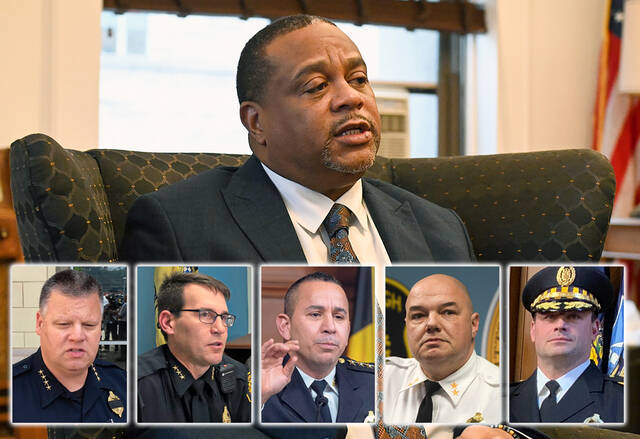Not much can faze Elizabeth Pittinger, the eyes of police oversight in Pittsburgh for the past 27 years.
But even the longtime executive director of the Pittsburgh Citizen Police Review Board is alarmed by the recent revolving-door leadership that has fomented turmoil in the 758-officer force.
“We’ve never had anything like this before,” said Pittinger, who has watched two chiefs walk out the door since October. “They need to get a good handle on just what the hell is going on in that bureau.”
Leadership woes at the Pittsburgh Bureau of Police have made an impression beyond city limits.
“This is not normal,” said Chuck Wexler, executive director of the Police Executive Research Forum, a policing think tank in Washington, D.C. “What Pittsburgh needs is a sense of stability and a sense of direction.”
Pittinger and Wexler are hardly alone.
Pittsburgh police officers, city politicians and local activists alike were stunned by the departure last week of Pittsburgh police Acting Chief Christopher Ragland, Mayor Ed Gainey’s hand-picked candidate to replace Larry Scirotto. For many of them, it was a here-we-go-again moment.
Ragland, a 30-year bureau veteran, cited political pressure as one of the triggers for his exit. He led the bureau for just four months after Scirotto resigned.
Scirotto, hired after a national search that cost Pittsburgh more than $80,000, left Nov. 1 amid scandal over his return to moonlighting as an NCAA basketball referee. He had been on the job for 16 months.
Pittinger has worked alongside 11 chiefs during her tenure — five of them during Mayor Ed Gainey’s administration alone. One of them, Scott Schubert was a holdover from the administration of Mayor Bill Peduto who retired after nearly 30 years with the bureau. Thomas Stangrecki ran the department in an acting capacity during the search that led to Scirotto.
Some say the instability set off by the two recent resignations has left the bureau in an existential crisis its officers haven’t seen in a decade since former Chief Nate Harper resigned and then pleaded guilty in federal court to siphoning $30,000 in city money for his personal use.
“This might take them a decade or more to fix,” said Robert Swartzwelder, president of Fraternal Order of Police Lodge No. 1, which represents most city police officers. “It’s going to take years, with incentives, to get this police department back to the position where they need to be.”
Concerns about the bureau, its depleted ranks and its leadership carousel have been amplified by the upcoming Democratic mayoral primary pitting Gainey against Allegheny County Controller Corey O’Connor.
Several observers, including policy experts like Wexler, said Pittsburgh officials should wait to nominate a new chief until after the November election, when it becomes clearer who will likely be leading the city in 2026 and beyond.
The selection of a police chief is considered to be one of a mayor’s most important decisions.
While big-city chiefs typically don’t make arrests, patrol a neighborhood or investigate crimes, their role is critical.
“Chiefs set the tone for the department,” said Debra Kirby of Jensen Hughes, an international firm that consults on public safety matters. “(Chiefs) provide the guiding values and are the ones who build out the overall organizational policing strategy.”
What now?
Retired detective Tony Moreno worked under several chiefs during his 24 years on the Pittsburgh police force — and he said he’s seen this chaos before.
Moreno, who’s running on the GOP ticket in the May 20 mayoral primary, watched tensions rise three years after he joined the force. Pittsburgh entered into a consent decree in 1997 with the Justice Department to stamp out police misconduct.
The decree, backed by reforms by then-Chief Robert W. McNeilly Jr., was intended to improve accountability, modernize processes and bolster training.
Moreno said he sees parallels between current struggles and the bureau’s growing pains during the consent decree. He said elected leaders need to step in soon to totally reinvent the department.
“For the rank and file, there’s disarray,” said Moreno. “I can’t even begin to wonder for the City of Pittsburgh when they’re going to say, ‘Enough is enough.’”
McNeilly, however, told TribLive he’s reluctant to buy into some of the “sky is falling” narratives.
“Through my whole police-chief career, I’ve only heard morale being two things: ‘rock-bottom’ or ‘it’s never been this low,’” said McNeilly, now living in Florida and serving as a federal Justice Department monitor for the consent decree with New Orleans police. “There will always be people who say this is the best department in the nation — and those that’ll say it isn’t.”
Wexler, the Police Executive Research Forum executive director, told TribLive that Pittsburgh could benefit now from a “change agent” like McNeilly, who takes a long view on police leadership. Wexler’s nonprofit helped lead the national search that ended in McNeilly’s ascent to the bureau’s top post in 1996.
Then-Mayor Tom Murphy selected McNeilly from within the city’s ranks, a standard operating procedure that former Mayor Bill Peduto uprooted when nominating former Madison, Wis. police captain Cameron McLay to the chief’s post in 2014.
McLay, an outsider who often butted heads with the police union, lasted two years in Pittsburgh, then returned to Wisconsin. The average chief’s tenure in a U.S. city ranges from three to five years, Wexler’s group has said. McNeilly’s nearly 10-year run as Pittsburgh police chief is the fourth-longest in the bureau’s 157-year history.
Wexler said there is a silver lining to the recent resignation cloud.
“This might present Pittsburgh with an opportunity to basically say, ‘Where is this department today and where do we want it to be in the next five years?’” he said.
‘Downward spiral’?
A sense of direction is in short supply right now in the police bureau’s North Side headquarters.
At the same time, the upper echelon has thinned out. At one time, Pittsburgh police had a chief, a deputy chief and three assistant chiefs. Now there’s only an acting chief, Martin Devine, who was promoted from assistant chief following Ragland’s departure.
It’s unclear if Devine will seek the post permanently. When reporters recently asked Gainey where he might turn to seek future leadership within the bureau, the mayor said he planned to meet with the police force’s 14 commanders, who hold the rank just below assistant chief.
A local search could follow. Budgetary belt-tightening precludes another national search, city officials have said.
The police union is focusing on problems that go beyond who runs the bureau, such as dwindling manpower.
Three new police academy classes started under Scirotto’s leadership. Critics, however, said Pittsburgh’s new hires and recruits have been Band-Aid solutions for a police force rife with retirements and resignations.
The police bureau, whose ranks topped 1,200 in the early 2000s, lost more officers last year — 103 in all — than in at least a dozen years, the union said in December.
The Gainey administration also has lowered the ceiling — and the funding — for the bureau’s staff. Pittsburgh is budgeted to employ 800 officers in 2025, down from 850 a year earlier.
“If the city does not fix this staffing problem, Pittsburgh is headed to a downfall, and I don’t know how they’re going to recover,” Swartzwelder, the union president, said.
“I’ve been here for 33 years — we’re in a downward spiral,” Swartzwelder said. “And you can’t put that all on the chief.”
‘A laughingstock’
City Councilwoman Barb Warwick, however, pushed back against that take. She stressed the bureau is not in as bad shape as headlines might suggest.
Homicides and nonfatal shootings are down, she noted. The city has bolstered its complement of officers with civilians and social workers.
In 2023, the Gainey administration inked a new union contract with pay raises for officers. Last year, it established a telephone reporting unit that has freed many officers from handling low-level complaints and shuffling mountains of paperwork.
“My take on Pittsburgh, having lived in other cities, is that Pittsburgh is an incredibly safe city,” said Warwick, who lives in Greenfield. “Folks in Pittsburgh have no problem letting their kids walk to school.”
Others worry about the state of the bureau — and the officers themselves.
David Harris, a University of Pittsburgh law professor, said taking politics out of the conversation about leadership is not realistic. Harris took part in 2023 in Pittsburgh’s police-chief search.
“With an election coming up, a primary in May, you’re not going to find somebody from outside who’s magically interested in that (chief) job,” Harris told TribLive.
“Politics will always intrude at some level,” he added. “It’s inevitable because you have the police chief accountable to the mayor, and the mayor who’s accountable to the voters.”
Councilman Anthony Coghill, who chairs the governing body’s public safety committee, said he, too, answers to voters when it comes to the effectiveness of a police chief.
The Beechview Democrat has found himself on the business end of political finger-pointing.
Coghill said he met Ragland and asked who he planned to surround himself with in the top brass. The councilman said he supplied names of current supervisors when Ragland asked for his input.
But Ragland later characterized Coghill’s suggestion as ethically questionable.
Gainey called it a demand for a favor in exchange for voting to appoint Ragland as chief.
Ragland has declined to comment on the matter.
Coghill, whose brother heads the Canonsburg police force and whose cousin is the police chief in Monroeville, insists there was no quid pro quo with Ragland.
“I’m the public safety chairman. I’m part of the face of this operation. And if I want Mickey Mouse to be an assistant chief, I’m going to let that be known,” Coghill told TribLive.
Coghill said he thinks practically and worries the bureau’s current temperature will hurt retention and recruitment.
Both are key as Pittsburgh police force, like those in many U.S. cities, struggles with staffing, he said.
“I’ve never seen it more unstable,” Coghill said. “From an outsider’s perspective, we’re a laughingstock. … People are scratching their heads and going, ‘What the hell is going on?’”
“I’ve never felt more unsure about this police force — ever.”








